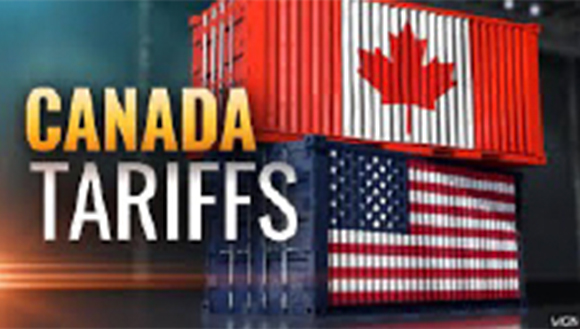Ottawa and Washington Exchange Document Outlining Possible Terms of Deal
Canada and the US are making progress towards a trade agreement, with a working document outlining details of a potential deal being sent back and forth between Ottawa and Washington. The document states that Canada is willing to participate in the Golden Dome security program, mentions Canadian commitments to build more infrastructure in the Arctic, Canada’s pledge to meet its NATO defense spending targets, and previously announced border security investments.
Canada’s contributions to national and global security have become an irritant in the Canada-U.S. relationship, with Trump accusing Canada of not doing enough. It remains unclear what the American side is willing to commit to, although Canada has lobbied aggressively for tariff relief. The U.S. has imposed a wide range of tariffs on Canadian exports, including 25% tariffs on all Canadian goods and 10% tariffs on Canadian energy, citing concerns about security along the border and the flow of fentanyl into the U.S.
There are carveouts for products compliant with the Canada-U.S.-Mexico Agreement (CUSMA), as well as tariffs related to the auto sector. Trump also upped tariffs on steel and aluminum for nearly all U.S. trading partners to 50% from 25% last week.
CBC News has asked the White House, the U.S. Trade Representative’s office, and the U.S. Department of Commerce for comment, but they declined to respond on the record. A second source with direct knowledge of the situation told CBC News that trade negotiations are moving in a positive direction, but not traditional trade talks.
Source: CBC
Trump’s Tariffs on Canada, World To Stay in Place During Case, Court Rules
A federal appeals court has ruled that U.S. President Donald Trump’s global tariffs will remain in place while a case is heard, extending an emergency stay granted after a lower court found the duties unlawful. The United States Court of Appeals for the Federal Circuit found “a stay is warranted under the circumstances,” providing a temporary victory for the Trump administration as it hits its first legal barriers for realigning global trade. The Trump administration is legally using the powers granted to the executive branch by the Constitution and Congress to address national emergencies of persistent goods trade deficits and drug trafficking.
The U.S. Court of International Trade last month said Trump does not have the authority to wield tariffs on nearly every country through the use of the International Economic Emergency Powers Act of 1977. The act, usually referred to by the acronym IEEPA, is a national security statute that gives the U.S. president authority to control economic transactions after declaring an emergency. The ruling from the three-judge panel at the New York-based federal court in May said, “Any interpretation of IEEPA that delegates unlimited tariff authority is unconstitutional.” It said “the challenged tariff orders will be vacated,” representing a nationwide injunction against any further imposition of the duties.
The Trump administration quickly was granted an emergency motion, essentially freezing the decision by the trade court that blocked the so-called “Liberation Day” and fentanyl-related tariffs. The appeals court upheld that stay but noted the need for an expedited hearing, saying, “These cases present issues of exceptional importance warranting expedited en banc consideration.” A proposed schedule says arguments are expected in court by July 31. That means that countries will continue to be hit by those duties, for now.
George Mason University law professor Ilya Somin called the decision an “unfortunate decision.” He noted that the court did go out of its way to indicate this is not a ruling on the merits and ordered an expedited schedule for consideration of the case. At least seven lawsuits are challenging the tariffs.
Source: Global News
Source: Huff Post
Carney Says Canada Is Preparing Reprisals if Tariff Talks With Trump Fail.
Canadian Prime Minister Mark Carney has announced that his government is preparing for further retaliation measures if negotiations with the United States to end the recently doubled tariffs on steel and aluminum fail. The move to double levies on steel and aluminum imports, bringing them up to 50%, is deemed “illogical” and “unjustified.”
Ontario Premier Doug Ford has expressed his support for the federal government to impose another 25% on their steel, stating that the situation is “bad for American workers, bad for American industry, and, of course, for Canadian industry as well.”
Carney said the government is focused on ongoing “intensive discussions” with the United States and called the latest round of tariffs “bad for American workers, bad for American industry, and, of course, for Canadian industry as well.” He noted that the American action is global action and will take some time, but not more.
Ford suggested that the two countries are close to a deal after Canada-U.S. Trade Minister Dominic LeBlanc visited Washington earlier this week, but senior officials downplayed those comments. Canada’s envoy to Washington, Ambassador Kirsten Hillman, said it is “too soon to say we are close” to a deal.
Ontario is considering its own retaliation, suggesting “everything is on the table.” Industry Minister Mélanie Joly said she has been on the phone with steel and aluminum sector CEOs and knows many Canadians are anxious for Ottawa’s next moves. She said they are looking at different scenarios right now and will make a decision, but they need a bit more time right now.
Canadian steel and aluminum industries say doubling the tariffs will have a devastating impact, as the industries are already dealing with job losses and a drop in shipments, as Canada is the top exporter of those metals to the U.S. Finance Minister François-Philippe Champagne said that the steel and aluminum industry is key to Canada’s prosperity, and they will be there fighting.
The Conservatives pushed for an emergency debate in the House of Commons on Trump’s 50% tariffs, but the request was denied. Conservative deputy leader Melissa Lantsman on social media said that the “elbows up” prime minister promised Canadians he was the “man with a plan’ to stop U.S. tariffs on Canadian industry. Interim NDP Leader Don Davies said he is a bit surprised that Carney needs more time.
Source: CBC
Source: Globe and Mail
Source: MSN
Source: Financial Post
Source: Bloomberg
Evidence Builds That Tariffs Are Chewing Into Canada’s Economy
Canadian companies are facing a significant impact from US President Donald Trump’s tariffs, according to warnings from executives at major retailers and real-time economic data. Loblaw Cos. Ltd., the grocery giant, has been able to limit the hit from tariffs to about 1,000 of its 80,000 items, but it is expected to rise above 3,000 in the next week or two as inventory runs out and potentially top 6,000. More product categories will be affected, including natural foods, pantry items, and beauty products. Walmart Inc.’s chief financial officer, John David Rainey, said that tariff-induced price increases are imminent.
While progress with the UK and China was encouraging, optimism about those agreements has already started to unravel. Some are casting doubt on the value of the deal between the US and the UK, which left the former still stuck with a 10% tariff on exports. Despite the U.S.-China trade war pause, Chinese products destined for America still face import taxes of nearly 50% when previous duties are accounted for.
The effect of the tariff policies is starting to show up in economic data as well. In Canada, manufacturing sales fell 1.4% in March, the second consecutive decline, with sales contracting in 13 of the 21 sub-sectors. The outlook for manufacturing this year remains bleak. Sales of primary metals, including steel and aluminum, fell 6.5% month over month in March, and motor vehicle sales contracted 1.1%. With auto and steel tariffs still in force, it is expected that sales in these sub-sectors are likely to remain weak.
Canadian jobs data for April revealed that employment in the trade-sensitive manufacturing and wholesale and retail sectors fell, while the jobless rate climbed to 6.9% from 6.7% in March. US retail sales data also showed tariffs are finally catching up and overtaking the economic narrative. Headline retail sales in April rose 0.1%, down significantly from 1.7% in March as “tariff front-running” came to a halt.
Source: Financial Post











